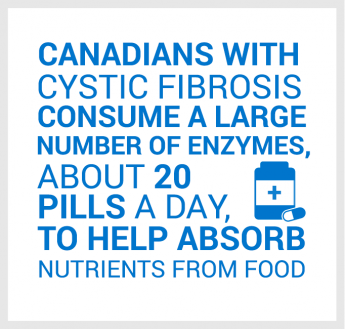Dr. Cara Haney is a professor at the University of British Columbia and has recently been funded with an Early Career Investigator award through Cystic Fibrosis Canada’s 2021 Grants & Awards competition for her research study, Pseudomonas aeruginosa environmental sensing to establish chronic infection. Early Career Investigators are researchers who have recently opened an independent research laboratory at a university or hospital research institute. CF Canada has placed a priority on funding strong researchers who are early in their careers to help build and maintain a robust CF research community in Canada, now and into the future, with the skills we will need for the next generation of breakthroughs in CF.
In 2021, Cystic Fibrosis Canada worked with the cystic fibrosis community to determine the community’s top 11 CF-related health areas of focus. One of these was to “Eradicate chronic Pseudomonas aeruginosa infections.” Dr. Haney’s research study, if successful, will contribute to this important community health priority.
This is Dr. Haney’s first time being funded by Cystic Fibrosis Canada and she has been awarded the Marsha Morton Early Career Investigator Award. This award is named after a 13-year-old girl who died of cystic fibrosis in 1988 and is sponsored by the Kinsmen & Kinette Clubs of Canada, an organization that has worked tirelessly to help fund cystic fibrosis research. The award is presented to the highest-ranking application in the Early Career Investigator category in each year of the Grants & Awards competition. Marsha Morton was the official representative and poster child of the Kin-CF Canada partnership. Her spirit and motivation exemplify Kin Canada’s commitment to the CF cause.
Read our interview with Dr. Haney, discussing her work and involvement with Cystic Fibrosis Canada.
How did you become involved in cystic fibrosis research and what do you enjoy most about your work?
I am trained as a plant biologist, and my lab studies bacteria that are associated with plants or animals but don’t normally cause disease. There are a lot of those bacteria, whether it is in our gut, our lungs or on plant roots. You might imagine that becoming a pathogen on a plant and on a human would be really different, but it is not as different as it might seem. Plants and animals both have immune systems, and it turns out that how bacteria tolerate and overcome immune systems is similar. If you take away a plant’s immune system, it reflects people with CF whose immune system isn’t functioning properly. It seems that there are some parallels between how these bacteria become pathogenic.
Your CF Canada supported research is focused on Pseudomonas aeruginosa. What is Pseudomonas aeruginosa? Why does this type of bacteria often cause “chronic” or persistent infections that are difficult to get rid of?
Pseudomonas aeruginosa is an opportunistic pathogen, meaning it’s a bacterium that is associated with our skin and in our lungs, but it doesn’t cause disease for most people. There is something about the lungs of a person with cystic fibrosis that allows the bacteria to grow to higher levels. Once Pseudomonas aeruginosa is established in the lungs, it is hard to get rid of and is notoriously resistant to antibiotics. Our lab is trying to understand what allows it to be such a successful opportunistic pathogen in the first place. It appears not just in the CF lung but in other instances as well, such as wounds and abrasions.
What do you hope to achieve in this research study?
Our focus is a little different from many other studies on Pseudomonas aeruginosa. Given that they are already present in the lungs, we are trying to understand what predisposes them to becoming such opportunistic pathogens. Rather than waiting until Pseudomonas has become a chronic antibiotic-resistant infection and then trying to develop a new antibiotic to treat it, we are hoping that we can understand the very early stages of how Pseudomonas realizes it is in the CF lung so that we can stop those early stages before it turns into an aggressive pathogen. We hope that we can develop therapeutics or other approaches that would block that early step, to stop chronic Pseudomonas lung infections before they start.
What are your latest research findings?
We found that during those early steps, Pseudomonas must somehow sense its environment. It can tell that it is in the CF lung and adapt accordingly by changing its physiology. We have found some specific modifications that hadn't been found previously in the outer membrane structures. The bacteria have an outer membrane coating, and under that, they have a specialized membrane, and that membrane is important in antibiotic resistance. They are good at making a tight seal that doesn’t allow antibiotics to get in. There are modifications that don’t normally happen in the environment, but they happen when the bacteria colonize areas such as the lung. By understanding that, we hope to develop drugs to actually block those modifications, which would prevent the bacteria from becoming pathogens. Instead, they would just stay being commensal, non-pathogens in the lung (Editor’s note: commensal bacteria are bacteria that are normally present on the surfaces of the body, are not harmful, and in some instances may even be beneficial to the body).
What will this mean for people living with Cystic Fibrosis?
My hope is that rather than waiting until people have these difficult-to-treat infections, we can instead understand what allows those infections to happen in the first place. Hopefully, these bacterial infections will be less of a problem for people who are able to take Trikafta, but that may not be the case for everybody. We also don’t know if those individuals will still harbour low-level infections that could become more serious over time. My hope is that if we can make sure the Pseudomonas doesn’t switch to the chronic infection stage, then it will help maintain lung function and improve quality of life for everyone with CF. I also hope more broadly that this could help with other chronic bacterial infections. I think there are some parallels with other skin infections and bacterial infections for people who are on immunosuppressant drugs, including people with CF who have had a transplant. So, my hope is that this will help the CF community, and also help with the hundreds of thousands of hospital-acquired infections and in individuals that end up with opportunistic diseases from otherwise commensal (non-pathogenic) bacteria.
Congratulations on receiving the Marsha Morton Early Career Investigator Award. Can you explain a little bit about the significance of this award to you and your study?
It always gives it more meaning when you're doing work in memory of somebody, especially somebody so young who worked so hard to better the community and has done so much good for CF. In the CF community, there are so many amazing advocates, historical and current, so it has been really great to work with the community and see the faces of the people you are working with. It is very meaningful for myself and the members of the lab to know that we might impact the lives of real people with a real need. It's truly inspirational.
And it's so amazing that CF Canada is an organization that gives a voice to members of the community so that they can advocate for themselves and others, especially teenagers who often have so much energy for advocacy work. It's great to see them have a platform here and in this case, a legacy.
“Research is a fundamental way in which the lives of Canadians with cystic fibrosis can change for the better,” Lisa Burechails, Chair of the Kin-CF Liaison Committee. “Kin Canada is proud to sponsor the Marsha Morton Early Career Investigator Award and we are honoured to present the award this year to Cara Haney, who will undoubtably go on to make meaningful change for cystic fibrosis.”
Kin Canada has raised an incredible $50 million over the duration of the Cystic Fibrosis Canada-Kin Canada partnership. This is the largest cumulative donation in Cystic Fibrosis Canada’s 60-year history. Cystic Fibrosis Canada is honoured to be part of this outstanding partnership.





